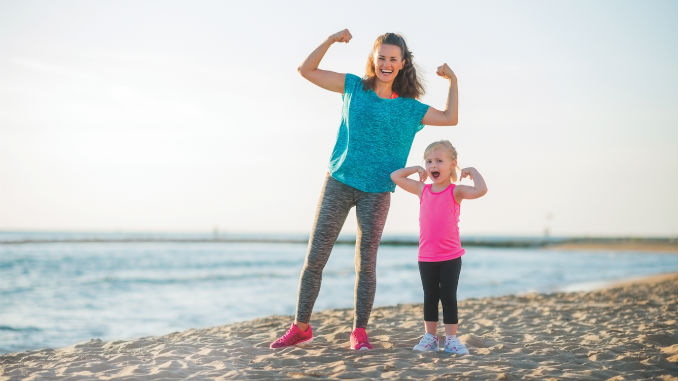
How modeling healthy behavior benefits today’s kids
Published: December 28, 2018
By: Sandi Schwartz
Helping your kids get active can keep them healthy — And Happy
As we all know, being a parent is the most important job in the world. Our children look up to us for guidance on everything in life — even if we don’t realize it.
One way to help our kids is to be a good fitness role model. Modeling healthy behavior and making fitness a fun part of our family’s daily routine can help shape our children’s views on exercise. This is important because, as we know, exercise plays such a critical role in our physical health and well-being. However, in an age of increasing stress and anxiety, fitness has another critical benefit: It can help us to be happier.
Exercise For Managing Stress and Anxiety
Experts have found a clear link between exercise and stress reduction. “Regular aerobic exercise has a unique capacity to exhilarate and relax, to provide stimulation and calm, to counter depression and dissipate stress,” Harvard scientists have concluded. Some studies show that for some people consistent exercise can be just as effective as medication to reduce symptoms of anxiety, according to the Anxiety and Depression Association of America. Other research shows that physically active people have lower rates of anxiety than those who do not exercise. In one study, researchers found that those who got regular vigorous exercise were 25 percent less likely to develop depression
or an anxiety disorder over the subsequent five years.
In helping to reduce stress and anxiety, exercise accomplishes the following:
Produces Endorphins. When we exercise, our body releases feel-good neurotransmitters called endorphins. These chemicals in our brain act as natural painkillers, making us feel better and less stressed. They are responsible for the natural high we get from a hard workout.
Reduces Stress Hormones. Reduced levels of stress hormones, like adrenaline and cortisol, helps us to feel calmer.
Minimizes Fatigue. Exercise improves blood flow and our body’s ability to use oxygen efficiently. These changes in our brain then reduce fatigue and improve alertness, concentration and cognitive function. When we are stressed out because we are depleted, many nerves in our brain and throughout out body are impacted. Exercise helps us return to a more balanced level of energy. If our body feels better, scientists conclude our mind will also feel better.
Improves Self-Esteem. Behavioral factors also contribute to the emotional benefits of exercise. When we gain strength and begin to see a difference in our body, we feel better about ourselves, becoming happier and more confident. This shifts our focus to positive thoughts and away from fear and anxiety.
Provides a Fun Distraction. One of the best parts about exercise is that it gives us a time to take a fun break from the stresses in our daily lives. Whether you are jogging to your favorite upbeat music or socializing with friends on the tennis court, your mind is distracted and you can just have a good time.
Makes Sleeping Easier. According to the Mayo Clinic, exercise can also improve how we sleep. This is great news for those suffering from insomnia due to stress and anxiety.
Encourages Mindfulness. A great bonus of exercise is that it provides the perfect opportunity to enjoy a mindful moment. While we work out, we can fully engage in the present moment instead of letting our mind run wild with worries. To get the best result, experts suggest doing rhythmic activities that engage the whole body, like running, walking, swimming, dancing, rowing or climbing.
The website http://www.Helpguide.org suggests that “as you move, instead of continuing to focus on your thoughts, focus on the sensations in your limbs and how your breathing complements your movement. If your mind wanders to other thoughts, gently return to focusing on your breathing and movement. If walking or running, for example, focus on each step — the sensation of your feet touching the ground, the rhythm of your breath while moving, and the feeling of the wind against your face.”
